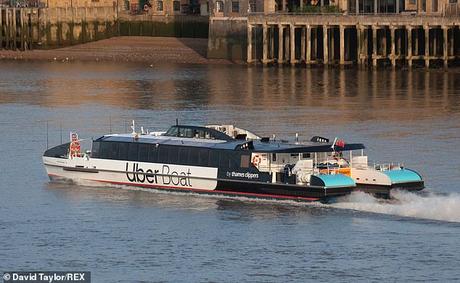The River Thames is also known as Isis -flows through southern England including London. At 215 miles (346 km), it is the longest river entirely in England and the second-longest in the United Kingdom, after the River Severn. It flows through Oxford and rises at Thames Head in Gloucestershire, and flows into the North Sea via the Thames Estuary. The Thames drains the whole of Greater London.
London River Services Limited is a division of Transport for London (TfL), which manages passenger transport—leisure-oriented tourist services and commuter services—on the River Thames in London. River service had been a common means of transport in London for centuries, but died off in the early 1900s, as transportation was enhanced (and river traffic somewhat blocked) with a proliferation of bridges and tunnels. With these numerous north-south crossings of the Thames, which is generally no more than 300m wide as it runs through central London, the revival of river boat services in London therefore mostly travel east or west along the Thames rather than across it; the only major cross-river ferry services are to be found further downstream where the river is wider, and there are far fewer bridge/tunnel crossings.
Marine can be broadly classified into Cargo and Hull Insurance. Marine Hull Insurance covers loss or damage to hull [ie., ship / boat] and machinery. The hull is the structure of the vessel. Machinery is the equipment that generates the power to move the vessel and control the lighting and temperature system such as boiler, engine, cooler and electricity generator.Just like Institute Cargo Clauses to Cargo Insurance, it is Institute Time Clauses for Marine Hull.ITC are generally time policies for a period of 12 months. As the nature and degree of risks which the Insurer run vary according to the kind of vessel, there exist a number of categories in the Time Clauses.
Until 1824, Lloyd's and two insurance companies, the London Assurance and the Royal Exchange Insurance, were the only entities allowed by law to conduct marine insurance business in the United Kingdom.Lot evolved after that with the expansion in the no. of companies and types offered.For long it was thehistoric S.G. form, which had its own origins in the 17th Century.From 1883 onwards,considerable number of Lloyd's clauses were adopted for general use and in 1884 the Institute of London Underwriters was formed. The first full set of Institute Time Clauses were introduced by1888. As trade and other circumstances changed, new versions were introduced, latterly consisting of Hull Clauses dated 1.10.52, 22.7.59, 1.10.69, 1.10.70, 1.10.83 and 1.11.95 & 2003.In 1983, although the cover did not change materially, radical revision of the clauses was undertaken. The time honoured S.G. form disappeared and its key features were incorporated into the Institute Time Clauses, to produce a unified core policy document. Using the same format, a further set of clauses (1.11.95) were published, but found little favour.
While vehicles on road evenwith costly gadgets for protection get stolen, will that happen to a Ship or boat on water ?.. .. MailOnline reports that a man in 20s jumped wharf security gate and stole Thames Clipper river bus before leading Marine Police on a dramatic chase along the River Thames!Interesting !!

However, the man’s luck ran out sooner as Specialist marine police officers swooped on the stolen river bus and seized control during a dramatic chase on the River Thames, near to London's Tower Bridge.It is reported that Marine support units intercepted the Thames Clippers vessel in the early hours of Saturday morning after police received reports of a man jumping a security gate and stealing a river bus from Trinity Buoy Wharf in Poplar, east London.Police say the marine support units, who had their blue lights illuminated, attempted to stop the vessel, which slowed but did not come to a stop. Marine officers instead decided to board the Thames Clippers vessel, which was said to be traveling 'at speed' prior to police intercepting it, and took control of it. The vessel was then taken to Canary Wharf dock, where Metropolitan Police officers arrested a man in his 20s.
The man, who is thought may be a former employee of Thames Clipper, was arrested on suspicion of burglary and theft. Police say he remains in custody at this time and that investigations continue. A spokesperson for the Metropolitan Police today told MailOnline: 'On Saturday August 29, at 3:10am, marine support units were called to reports that a man jumped over a security gate and stolen a Thames Clipper boat from Trinity Buoy Wharf.
Thames Clippers is a river bus service on the River Thames in London. It runs commuter services between eastern and central London, as well as tourist services. Around 10,000 passengers use the service each day. In June this year, America company Uber won the naming rights to the service, which has since been re-branded 'Uber Boat by Thames Clippers'.
Before concludingITC Hulls (though provides broad coverage) are named perils policies and relevant section of the recent clauses in vogue read under 2 : Perils :
2.1 This insurance covers loss of or damage to the subject-matter insured caused by 2.1.1 perils of the seas, rivers, lakes or other navigable waters 2.1.2 fire, explosion 2.1.3 violent theft by persons from outside the vessel 2.1.4 jettison 2.1.5 piracy 2.1.6 contact with land conveyance, dock or harbor equipment or installation 2.1.7 earthquake, volcanic eruption or lightning 2.1.8 accidents in loading, discharging or shifting cargo, fuel, stores or parts 2.1.9 contact with satellites, aircraft, helicopters or similar objects, or objects falling therefrom.
Another interesting thing of note is that Clause 2.1.9 now includes specific reference to satellites and helicopters, and such air-borne perils have now been separated from those relating to land conveyances and harbor installations (2.1.6).
With regards – S. Sampathkumar
30.08.2020.

